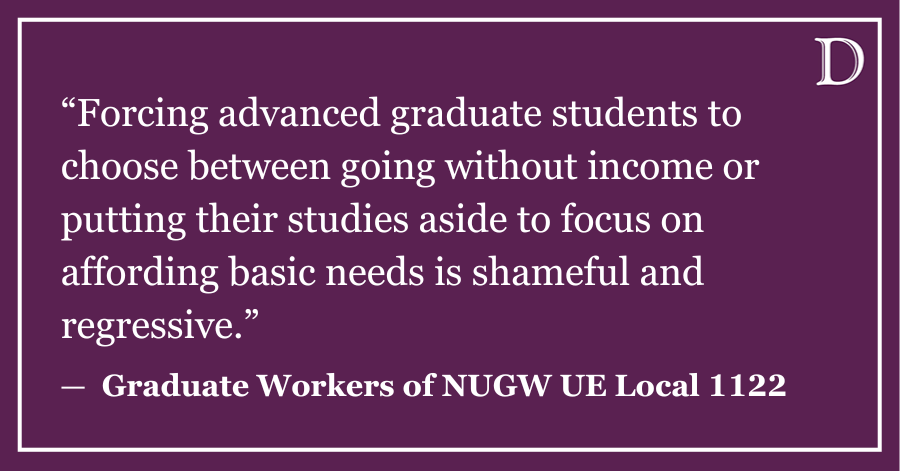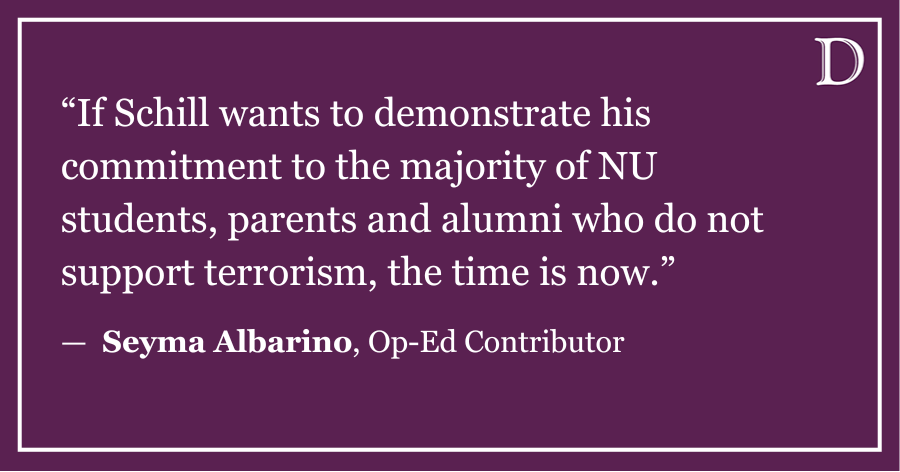In broadcast news interviews, on social media and in everyday conversations, it seems like Palestinians are always expected to prove their humanity.
In today’s conversations about Palestine and Israel, a pervasive issue emerges — the tendency to cast Palestinians as inherently violent. As Hala Alyan notes in an op-ed in The New York Times, “The real problem with condemnation is the quiet, sly tenor of the questions that accompany it: Palestinians are presumed violent — and deserving of violence — until proved otherwise.” This encapsulates the broader challenge faced by Palestinians –– they are asked to disavow certain political entities or ideologies to be considered reasonable.
This vicious pattern can be seen clearly in the immediacy with which the media asks Palestinians and pro-Palestine activists to condemn Hamas. For example, in the past month’s top 10 most viewed YouTube videos under the search phrase, “Interview with Palestinian activist,” every pro-Palestine interviewee was asked to condemn Hamas. This is dangerous; asking this question directly contributes to the erasure of Palestinian suffering and deaths by implying Palestinians are not victims themselves. Journalists and public figures alike thus portray Palestinians as inherently violent.
I ask, in how many mainstream media interviews with Israelis have citizens and activists been asked to condemn their government’s actions? To condemn the ongoing removal of Palestinians from their homes in the West Bank, or the murder of over 8,000 Palestinians in Gaza, according to its Ministry of Health, or the continuous acts of apartheid violence to which Palestinians are subjected? From what I have seen, Palestinians and pro-Palestine activists have faced a sharp double standard in interviews in comparison to Israelis and pro-Israel activists.
When interviewing Jewish-American conservative political commentator Ben Shapiro, journalist Piers Morgan began by empathetically asking Shapiro about his experiences learning of the Oct. 7 attacks. In contrast, when interviewing Palestinian National Initiative party leader Mustafa Barghouti, Morgan immediately asked for Barghouti’s response to what Morgan called a “reprehensible terrorist attack by a bunch of medieval barbarians.”
Now, suppose activists and Palestinians even try to follow up that question by contextualizing Hamas’ actions as an example of radicalization occurring under the extreme conditions created by Israel’s mistreatment of Palestinians. In that case, they are accused of brutality and antisemitism.
But let’s be clear — this attack, while tragic, should not be seen as unpredictable. Oppression leads to radicalization and attraction toward extremist groups, according to the American Psychological Association. Therefore, the long-term acts of brutality perpetrated by the Israeli state, which have been condemned by Human Rights Watch, Amnesty International and the U.N., have contributed to the rise of extremist groups opposed to the state of Israel.
This conversation draws parallels to the discourse following 9/11, specifically the harsh criticism of opinions that differed from the hegemonic narrative. Notably, American critic Susan Sontag questioned why the tragedy was not recognized as “a consequence of specific American alliances and actions” in the New Yorker. The swift and intense pushback she faced resembles the current backlash pro-Palestinian activists face while trying to examine the underlying reasons for the attack on Oct. 7.
Following 9/11, former President George W. Bush said, “Either you are with us, or you are with the terrorists.” Similarly, posters were put up around campus in early October that said, “Hamas is ISIS. If you don’t stand with Israel, you stand with ISIS.” This ideology is a play taken almost verbatim out of the George W. Bush handbook. The poster was not only illogical, but also deeply racist and contributed to the continued dehumanization of Palestinians on this campus and around the world. The same type of propaganda spread after 9/11 is being disseminated now, using the Hamas attack on Oct. 7 as ammunition to build support for the Israeli state. The rhetoric propagated after the Oct. 7 attacks presents a false dichotomy and ignores the experiences of Palestinian civilians.
The dehumanization of Palestinians and civility politics is seen in statements made by U.S. and NU officials alike. President Biden recently questioned the Palestinian death toll, prompting the Palestinian Health Ministry to release the names of those who have been killed.
In an email last week from University President Michael Schill and Provost Kathleen Hagerty, the widespread issue of civility politics being enforced on Palestinians came to a head. The message inadvertently urges students to take a neutral stance by advising students to stick to purely respectful speech.
While the email acknowledges the importance of free expression, the underlying tone unreasonably expects activists to remain passive and respectful in the face of genocide and mass violence. Civility politics disproportionately affects marginalized or oppressed groups, and in this context, Schill and Hagerty’s message tells Palestinian students to prioritize a tone of civility over expressing the raw realities of their experiences. The U.S. government is complicit in this ongoing genocide, but that doesn’t suprise me. To see that our University officials are complicit as well is devastating.
The reality we are living in has clearly heightened tensions across the NU community, and rightfully so. Taking hostages and murdering civilians are undoubtedly horrific crimes that should be universally condemned. However, continuing to ask for condemnation from Palestinian activists is nothing more than racism and dehumanization. We cannot let the outrage and sadness we are feeling at this moment lead to the demonization and dismissal of Palestinian lives.
If you would like to respond publicly to this op-ed, send a Letter to the Editor to [email protected]. The views expressed in this piece do not necessarily reflect the views of all staff members of The Daily Northwestern.















